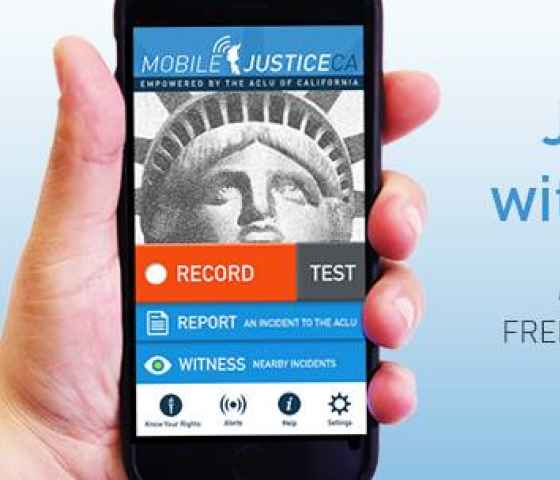IF YOU ARE STOPPED, QUESTIONED OR SEARCHED BY A LAW ENFORCEMENT OFFICER
An encounter with law enforcement can be stressful and scary. Below we describe your constitutional rights during police interactions and offer strategies for handling these encounters. However, it is never your responsibility to de-escalate an encounter—that responsibility lies with police officers only. Unfortunately, you cannot assume that officers will protect your safety, follow the law during your encounter or respect your assertion of your constitutional rights. While you may reduce the risk to your safety by staying calm even if an officer is not behaving respectfully and choosing your words, movement, body language, and emotions carefully, we acknowledge that attempting to put an officer at ease cannot guarantee your safety and people have still been injured or killed after doing so.
STRATEGIES FOR REDUCING THE RISK TO YOURSELF
- Do not get into an argument with the officer. Stay safe.
- Do not lie or use false documents.
- Think carefully about your body language, movement, and emotions. Act calmly. Don’t do anything the officer might perceive as a physical threat or as reaching for a weapon.
- Even if you object to a search, never physically resist or pull away.
- Do not run or do anything to suggest that you are attempting to flee.
- Keep your hands where the officer can see them.
- Do not resist or touch an officer, even if you believe they are acting unlawfully.
IF YOU ARE STOPPED FOR QUESTIONING OR SEARCHED
- Before asking you any questions, officers are usually required to tell you the reason for stopping you. This applies whether you are stopped in a car or while walking. An officer can no longer ask you to tell them why they stopped you or pulled you over. If the officer asks you why they stopped you, do not give them any information. Ask them to tell you the reason for the stop.
- You do not have to show your identification to an officer unless you are being lawfully detained or arrested.
- However, if you are driving you do have to provide your driver’s license if asked, or else you may be ticketed or arrested for driving without a license.
- You have the right to remain silent and should not be arrested or detained for refusing to answer questions. For example, say, “I am exercising my right to remain silent.”
- Do not forget that police are legally allowed to lie, intimidate, and bluff.
- You do not have to answer questions regarding your place of birth, your immigration status, or how you entered the United States. You should only discuss immigration matters with your lawyer. (Reminder: separate rules apply at airports and international borders or if you have certain types of nonimmigrant visas like tourist or business visas).
- If you are not under arrest or being detained, you have the right to leave. However, before leaving, ask the officer if you are free to do so. For example, say, “Am I being detained?” and “Am I free to go?” If they say “yes,” calmly leave. If they say “no,” ask why by saying, “Can you tell me why you are stopping me?”
- You should not agree to a search of yourself, your car, or your belongings. You can calmly tell the officer, “I do not consent to a search.” However, even if you do not agree to a search, the officer may still search you against your will. (Reminder: Saying you do not agree before or during a search helps preserve your rights if you later go to court).
- When an officer searches you, they can pat down your outer clothing if they think you might have a weapon.
- If you agree to a search, know that you can change your mind at any time. Speak clearly and let them know that you are no longer consenting to the search.
IF YOU ARE ARRESTED
- If you are being arrested (driver or passenger), the officer may ask you for identifying information such as your name (and its spelling), birth date, and address.
- Do not answer any questions about your place of birth, your immigration status, or how you entered the United States.
- If you are arrested, you have the right to an attorney. Ask for an attorney immediately after being arrested. Ask for an attorney again if the officer reads you your rights or starts asking you questions. Make sure you clearly tell the officer that you want to talk with an attorney and that you are asserting your right to remain silent.
- Do not make any statements about what happened or the incident. Do not give explanations, excuses, or stories. Say “I want to remain silent” and “I want to talk to a lawyer.”
- Do not say anything, sign anything, or make any decisions without an attorney.
Note: if you are given a citation or ticket and are allowed to leave, the officer will ask you to sign the citation or ticket. Signing does not mean you are admitting guilt. It is just promising to show up for your court date. You should consider signing the ticket to avoid being taken to the police station.
- If you are arrested and are taken to the police station, do not talk about your case on the phone. The police might be recording your phone calls (except those to your lawyer).
- Do not talk or post about your arrest or case to friends or family, or on the Internet (e.g., Instagram, Tik Tok, e-mail, Facebook, Twitter, etc.).
IF YOU EXPERIENCED AN UNLAWFUL STOP, SEARCH, OR ARREST, FILE A COMPLAINT AND FIND AN ATTORNEY
- After the incident, write down everything you remember as soon as possible. Write down the officer’s name, badge number, patrol car number, the law enforcement agency, and all details about what happened, including what was said and any physical actions. Try to find witnesses and write down their names and phone numbers.
- If you are injured, get medical attention. You should also take photographs of the injuries as soon as possible and continue to take regular photographs of the injuries.
- Please reach out to an attorney for assistance as soon as possible to preserve your rights.
- After the unlawful stop or arrest, and once you are safe, you can file a complaint with the law enforcement agency against the officer. Do not tell the officer on the scene that you are going to file a complaint.
- If your complaint involves LAPD, you may also file a complaint with the Office of the Inspector General for the City of Los Angeles on their website: https://www.oig.lacity.org/how-to-file-a-complaint
- If your complaint involves LASD, you may also file a complaint with the Office of the Inspector General for the County of Los Angeles on their website: https://oig.lacounty.gov/commendation-complaint/
- If your complaint involves the Santa Ana Police Department, you may also file a complaint with the Police Oversight Commission on their website: https://www.santa-ana.org/police-oversight-commission-complaint-form/
- If your complaint involves a law enforcement agency in San Bernardino County, you may also file a complaint with the Civil Grand Jury on their website: https://wp.sbcounty.gov/grandjury/file-a-complaint/
- In addition to submitting a complaint with the local law enforcement agency and oversight entity, you should submit the complaint to the Commission on Peace Officer Standards and Training. You can file a complaint on their website: https://post.ca.gov/public-complaints
PHOTOGRAPHING OR FILMING AN INTERACTION WITH A LAW ENFORCEMENT OFFICER
- You have the right to record or photograph law enforcement officers while they are doing their job.
- However, you should avoid interfering with law enforcement activity. Keep a safe distance from any law enforcement encounter you are documenting to avoid physically interfering.
- Make sure you are not breaking any laws while filming. It is generally best to stand on a public sidewalk (as opposed to in the street or on private property), at a safe distance away from the incident, while you record.
- If you are not under arrest, officers cannot take your phone.
- Officers cannot delete or view your photographs or videos without a warrant.
- Even though you can legally record and photograph an encounter, an officer may order you to stop recording or to give them your phone. If you feel safe, you may attempt to exercise your right to photograph or record by calmly saying, “I have a First Amendment right to take photographs and videos and do not consent to handing over my phone or having it searched.” However, some officers may arrest you for not following their unlawful order. While the arrest would be unlawful and you may be able to challenge it later, you should weigh the personal risks of arrest and a search of you and your belongings against the value of continuing to record or photograph the interaction.
IF YOU ARE AN UNHOUSED COMMUNITY MEMBER
- Law enforcement and sanitation crews are not allowed to destroy your personal property.
- There are exceptions for items that pose an immediate threat to health or safety, or items that are evidence of a crime.
- You should generally be given notice before encampment removals.
- Notices should list the time and place for the encampment removals that are going to happen.
- You have the right to reasonable accommodations for disabilities.
- If you have a disability, you can ask for help to make things easier when dealing with government programs, services, or activities. For example, you can ask for special support at shelters or social services to fit your needs. You can also ask for help from local governments if they are removing an encampment.
- You have the right to photograph and film law enforcement and sanitation workers in public places while doing their job.
- Please refer to the above section for information on photographing or filming law enforcement.
- You have rights during encounters with law enforcement. If you are unhoused, you have the same rights as anyone else when stopped, searched, questioned, or arrested by police. This includes the right to remain silent and the right to an attorney upon arrest. Please refer to the above sections for more information on your rights.
- Inform ACLU SoCal. While ACLU SoCal cannot represent everyone who contacts us, we monitor civil rights issues and provide representation in limited situations. For assistance with houselessness issues, contact us at: 714-450-3966 or dignityforallhotline@aclusocal.org
If you or a loved one has been arrested or a victim of police violence, you may submit an online intake form and report this to ACLU of SoCal and complete our online form for assistance.
This information does not constitute legal advice.


